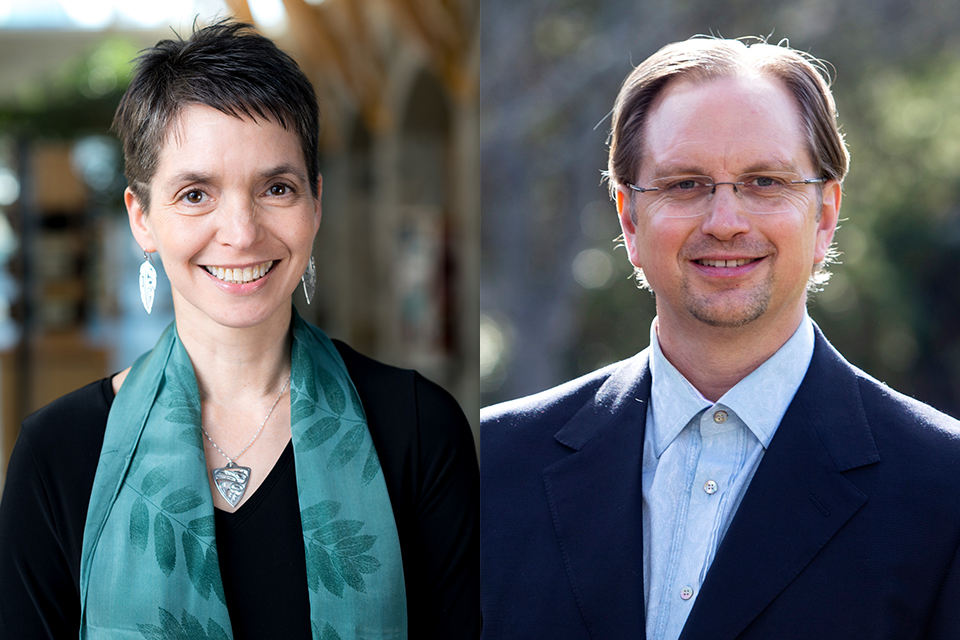Entrepreneurship and Indigenous education professors win prestigious teaching awards
Peter B. Gustavson School of Business

A professor of entrepreneurship who has helped boost the number of Indigenous-owned businesses across BC and a professor of Indigenous education who has made significant advancements in the indigenization of curriculum for BC students are the 13th and 14th University of Victoria scholars recognized with Canada’s most prestigious award for excellence in leadership and teaching.
Gustavson School of Business Professor Brent Mainprize, announced today as a 2020 3M National Teaching Fellow, is the fourth UVic scholar in six years to receive the award.
The newest accolade puts Mainprize in a class of his own: He is the only professor to have received three of the Society for Teaching and Learning in Higher Education’s (STLHE) top awards for outstanding educators. In 2016, Mainprize received STLHE’s Alan Blizzard Award for his role in a collaborative teaching team honoured for their work on the Aboriginal Canadian Entrepreneurs (ACE) program. And in 2014, Mainprize won STLHE’s D2L Innovation Award in Teaching and Learning.
“Entrepreneurship is a powerful concept because it’s about nurturing a student’s discovery of their own unique abilities and passions and supporting their development as they share them with the world,” Mainprize says. “To be recognized for my role in helping students starting their businesses is a tremendous honour.”
Mainprize is program director and co-founder of Tribal Resources Investment Corporation’s ACE program, which gives fledgling Indigenous entrepreneurs hands-on teaching, coaching and mentorship in their home community.
Since its launch in 2013, 384 students from 46 Indigenous communities across BC have graduated from the ACE program. More than 100 business ventures have been launched—and many more are in the planning stages. Many ACE graduates go on to further education or secure employment in their business area of interest. The program has also begun to specialize its offering for particular business interests, such as the Artist-ACE program, which focuses on Indigenous artisans.
ACE represents part of Mainprize’s work with Indigenous communities. Over his career, Mainprize has been invited to more than 40 Indigenous communities in BC to co-facilitate and co-design programs, under the community’s leadership, which focus on Indigenous-led economies through economic development and entrepreneurship. Mainprize continues to collaborate with the Nisga’a Nation to explore opportunities for sustainable economic prosperity while preserving heritage and culture. Haida Owned and Operated, an entrepreneurship training program specific to Haida citizens, is an outcome of this partnership. Mainprize is also a business faculty champion for UVic’s National Consortium for Indigenous Economic Development.
“We are proud and excited for Brent to be recognized for his teaching excellence,” says Gustavson Dean Saul Klein. “His leadership in entrepreneurship, Indigenous partnerships and experiential learning creates classroom experiences where students combine their creativity, culture and innovation in their business pursuits.”
For more than 25 years as a student, educator and researcher, Edōsdi–Judy Thompson has built relationships with Indigenous communities, developed courses and programs to indigenize curriculum, decolonize teaching and provide supports for Indigenous learners.
Announced today as a 2020 3M National Teaching Fellow, the associate professor of Indigenous education is the 14th University of Victoria scholar recognized with Canada’s most prestigious award for excellence in leadership and teaching. She is the fifth UVic scholar in six years to receive the award. Edōsdi, whose name means “someone who is a teacher” in the Tahltan language, has been at UVic since July 2019 from UNBC, where she was nominated for this award.
Central to her teaching style is the importance she places on identity and empowerment, or what she simply calls “voice.” She works to provide a safe learning environment that fosters self-reflection and the active participation of students in class activities such as discussions, group work, talking circles and oral presentations—ways for students to have their voices heard.
Edōsdi completed her PhD at UVic, where she also did an MSc in environmental studies. Her doctoral dissertation, Hedekeyeh Hots’ih Kāhidi—“Our Ancestors Are In Us: Strengthening Our Voices Through Language Revitalization From A Tahltan Worldview,” used a Tahltan research paradigm and explored ways in which the voices of her people can gain strength and healing through the revitalization of her language. Her doctoral research led to the development of a Tahltan Language Reclamation Framework, which focuses on governance, programming, documentation, training and professional development, and health and healing. From 2012 to 2019, she was the Tahltan language reclamation director for her Nation in northern BC.
Jean-Paul Restoule, UVic’s chair of Indigenous education, says he was struck by the selflessness of Edōsdi’s teaching. “She is driven by supporting students, ensuring viable language survival, lifting up community and is guided by her Tahltan ancestors and community respecting the 4R’s of Indigenous education: respect, relevance, reciprocity and responsibility,” he says. “As a teacher, she is guided by very high principles and values and this makes a difference to her students, her classes and her peers.”
Edōsdi herself feels that the biggest impact she is making in the revitalization and reclamation of Indigenous languages is at the personal level.
“It is crucial for all Canadians to know the history of the relationship between Aboriginal and non-Aboriginal peoples, to be educated about why Indigenous self-determination is key to reconciliation, and to know that reconciliation must be practiced every day on a personal level, but also in communities, governments, schools and workplaces,” she says. “All of this is crucial in order to deal with the larger systemic and cultural challenges inherent in our K-12 and post-secondary educational systems.”
Brent Mainprize and Edōsdi–Judy Thompson join past UVic 3M recipients, including Helga Thorson (Humanities), 2019; David Blades (Education), 2016; Jin-Sun Yoon (Child and Youth Care), 2015; A.R. Elangovan (Gustavson School of Business), 2012; Gweneth Doane (Nursing), 2006; Jamie Cassels (Law), 2002; Marty Wall (Psychology), 2001; Aaron Devor (Sociology), 2000; David Berry (Chemistry), 2000; Thomas Cleary (English), 1994; Elizabeth Tumasonis (History in Art), 1992; and Andy Farquharson (Social Work), 1986.
The 3M National Teaching Fellowship was established in 1986 through the generosity of 3M Canada and the Society for Teaching and Learning in Higher Education.
A media kit containing high-resolution photos of Brent Mainprize and Edōsdi–Judy Thompson are available on Dropbox.
-- 30 --
Photos
Media contacts
Brent Mainprize (Gustavson School of Business) at 250-721-6404 or brentm@uvic.ca
Krista Boehnert (University Communications + Marketing) at 250-721-6246 (cell) or boehnert@uvic.ca
Stephanie Harrington (University Communications + Marketing ) at 250-721-6248 or smharrin@uvic.ca
Edōsdi–Judy Thompson (Indigenous Education) at 250-472-5499 or edosdi@uvic.ca
Suzanne Ahearne (University Communications + Marketing) at 250-721-6139 or sahearne@uvic.ca

